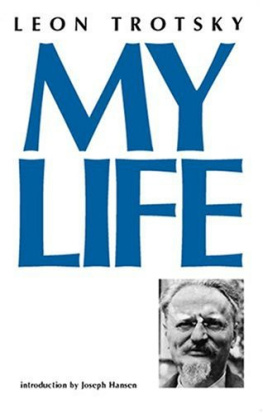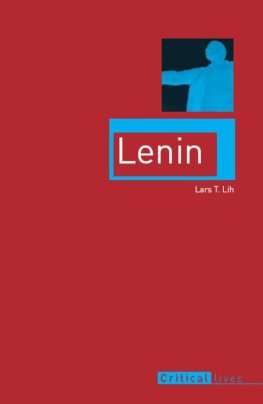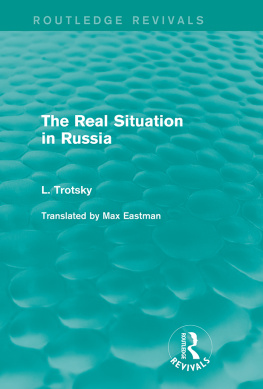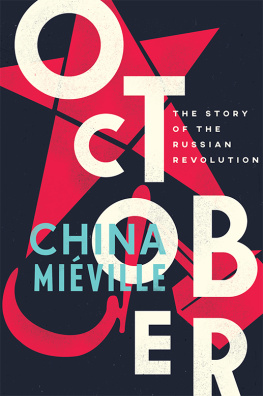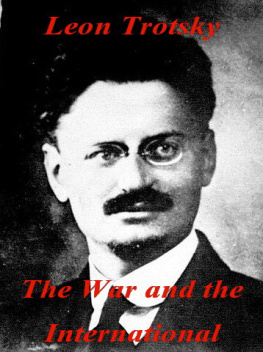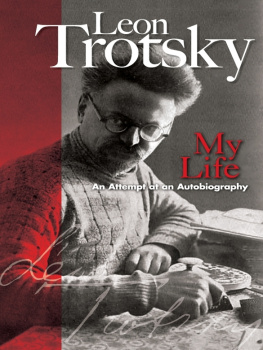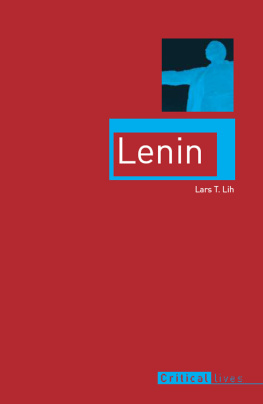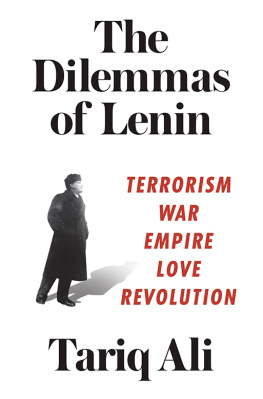Leon Trotsky
My Life
(1930)
My Life was originally published in 1930 by CharlesSchribners Sons, NY. Transcription and HTML markup for the Trotsky Internet Archive by David Walters in1998. Readers should note that the translation uses a form of written English combining both theBritish and the United States styles of English. The on-line version (base for this eBook) ofMy Life stays loyal to the literary structure, spelling and grammar of theoriginal version published in 1930 from which it was transcribed. Converted to eBook format by Kollektiv Yakov Perelman from the on-line version of MyLife available at Trotsky Internet Archive on 15January 2013. |
CONTENTS
(1935)
FOREWORD
O ur times again are rich in memoirs, perhaps richer thanever before. It is because there is much to tell. The more dramatic and rich in change the epoch,the more intense the interest in current history. The art of landscape-painting could never havebeen born in the Sahara. The crossing of two epochs, as at present, gives rise to adesire to look back at yesterday, already far away, through the eyes of its active participants.That is the reason for the enormous growth in the literature of reminiscence since the days of thelast war. Perhaps it will justify the present volume as well.
The very fact of its coming into the world is due to the pause in the authors activepolitical life. One of the unforeseen, though not accidental, stops in my life has proved to beConstantinople. Here I am camping but not for the first time and patiently waitingfor what is to follow. The life of a revolutionary would be quite impossible without a certainamount of fatalism. In one way or another, the Constantinople interval has proved themost appropriate moment for me to look back before circumstances allow me to move forward
At first I wrote cursory autobiographical sketches for the newspapers, and thought I would letit go at that. And here I would like to say that, from my refuge, I was unable to watch the form inwhich those sketches reached the public. But every work has its own logic. I did not get into mystride until I had nearly finished those articles. Then I decided to write a book. I applied adifferent and infinitely broader scale, and carried out the whole work anew. The only point incommon between the original newspaper articles and this book is that both discuss the same subject.In everything else they are two different products.
I have dealt in especial detail with the second period of the Soviet revolution, the beginningof which coincided with Lenins illness and the opening of the campaign againstTrotskyism. The struggle of the epigones for power, as I shall try to prove, was notmerely a struggle of personalities; it represented a new Political chapter the reactionagainst October, and the preparation of the Thermidor. From this the answer to the that I have sooften been asked How did you lose power? follows naturally.
An autobiography of a revolutionary politician must inevitably touch on a whole series oftheoretical questions connected with the social development of Russia, and in part with humanity asa whole, but especially with those critical periods that are called revolutions. Of course I havenot been able in these pages to examine complicated theoretical problems critically in theiressence. The so-called theory of permanent revolution, which played so large a rle in my personallife, and, what is more important, is acquiring such poignant reality in the countries of the East,runs through this book as a remote leitmotif. If this does not satisfy the reader, I cansay that the consideration of the problem of revolution in its essence will constitute a separatebook, in which I shall attempt to give form to the principal theoretical conclusions of theexperiences of the last decades.
As many people pass through the pages of my book, portrayed not always in the light that theywould have chosen for themselves or for their parties, many of them will find my account lackingthe necessary detachment. Even extracts that have been published in the newspapers have elicitedcertain denials. That is inevitable. One has no doubt that even if I had succeeded in making myautobiography a mere daguerreotype of my life which I never intended it to be it would nevertheless have called forth echoes of the discussion started at the time by thecollisions described in the book. This book is not a dispassionate photograph of my life, however,but a component part of it. In these pages, I continue the struggle to which my whole life isdevoted. Describing, I also characterize and evaluate; narrating, I also defend myself, and moreoften attack. It seems to me that this is the only method of making an autobiography objective in ahigher sense, that is, of making it the most adequate expression of personality, conditions, andepoch.
Objectivity is not the pretended indifference with which con firmed hypocrisy, in speaking offriends and enemies, suggests indirectly to the reader what it finds inconvenient to statedirectly. Objectivity of this sort is nothing but a conventional trick. I do not need it. Since Ihave submitted to the necessity of writing about myself nobody has as yet succeeded inwriting an autobiography without writing about himself I can have no reason to hide mysympathies or antipathies, my loves or my hates.
This is a book of polemics. It reflects the dynamics of that social life which is built entirelyon contradictions. The impertinence of the schoolboy toward his master; the pin-pricks of envy inthe drawing-room, veiled by courtesies; the constant competition of commerce; the frenzied rivalryin all branches of pure and applied science, of art, and sport; the parliamentary clashes thatreveal the deep opposition of interests; the furious struggle that goes on every day in thenewspapers; the strikes of the workers; the shooting down of participants in demonstrations; thepackages of explosives that civilized neighbors send each other through the air; the fiery tonguesof civil war, almost never extinguished on our planet all these are the forms of socialpolemics, ranging from those that are usual, constant and normal, almost unnoticeddespite their intensity, to those of war and revolution that are extraordinary, explosive andvolcanic. Such is our epoch. We have all grown up with it. We breathe it and live by it. How can wehelp being polemical if we want to be true to our period in the mode of the day?
But there is another and more elementary criterion, one that relates to plain conscientiousnessin stating facts. Just as the most bitter revolutionary struggle must take account of time andplace, the most polemical work must observe the proportions that exist between objects and men. Ihope that I have observed this demand not only in its entirety, but also in its particulars.
In certain cases although these are not very numerous I relate long-agoconversations in dialogue form. No one will demand a verbatim report of conversationsrepeated many years after. Nor do I claim such accuracy. Some of these dialogues have rather asymbolic character. Everyone, however, has had moments in his life when some particularconversation has impressed itself indelibly on his memory. One usually repeats that sort ofconversation to ones personal or political friends; thanks to this, they become fixed inones memory. I am thinking primarily, of course, of all conversations of a politicalnature.
I may state here that I am accustomed to trust to my memory. Its testimony has been subjected toverification by fact more than once, and it has stood the test perfectly. But a reservation isnecessary. If my topographic memory, not to mention my musical one, is very weak, and my visualmemory and my linguistic memory fairly mediocre, still my memory of ideas is considerably above theaverage. And, moreover, in this book ideas, their evolution, and the struggle of men for theseideas, have the most important place.

